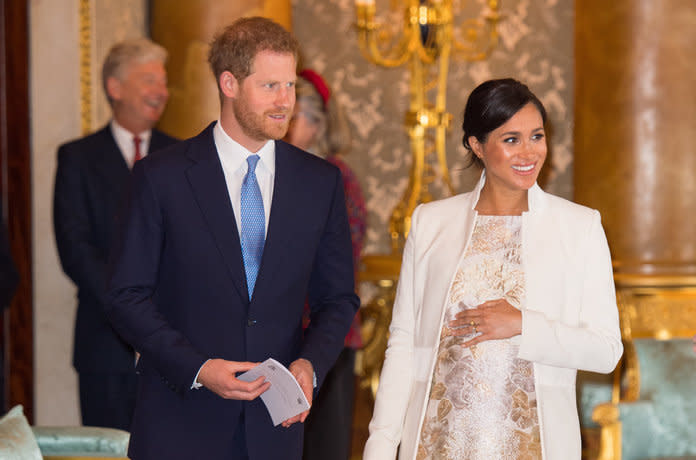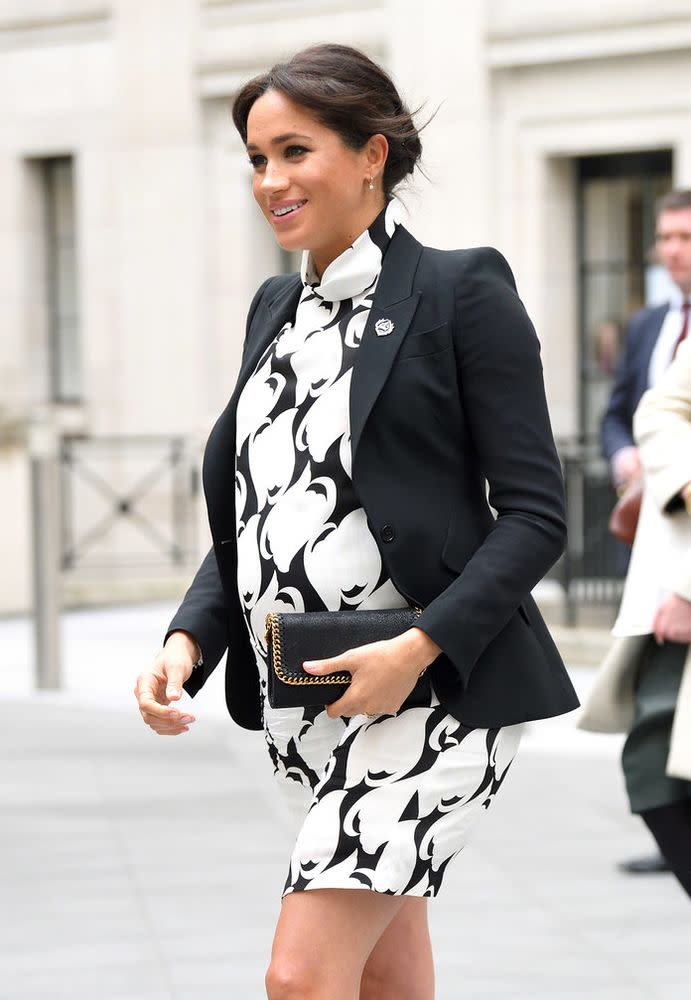Why Doctors May Consider Meghan Markle's Pregnancy "Geriatric"
Meghan Markle is 37 and she's pregnant. That means she's fallen into a category that medical professionals (rudely, IMHO) categorize as "geriatric" or "of advanced maternal age" for pregnant women. According to the CDC, she's in good company: Birth rates for women over the age of 30 in the U.S. are rising, while the birth rates for women under 30 are decreasing. For women age 30 to 34, the rate is up 1 percent; it's up 2 percent for the next age group, women 35 to 39; and up 4 percent for women age 40 to 44.
Doctors do treat "advanced maternal age" pregnancies differently. Here's everything you need to know about pregnancy in your 30s and beyond, as well as what precautions someone of Markle's age is likely taking to avoid the (relatively) increased risks associated.
What's a Geriatric Pregnancy?
Put simply, if you're pregnant and over the age of 35, then you have a geriatric pregnancy on your hands. But these days doctors have traded the term "geriatric" — which, for obvious reasons, has drawn ire from pregnant women as well as the culture at large — for "advanced maternal age."
That's good news for the rising number of women who are choosing to have children later in life. According to the CDC, the number of women who are waiting until they reach "advanced maternal age" to have children has increased in the United States over the last several years. In fact, between 2000 and 2014 it grew by 23 percent.
RELATED: Why 37 Is the Best Age, Even if You're Not Meghan Markl
What Are the Risks Associated With a Geriatric Pregnancy?
"The idea of advanced maternal age is based on two things — the health and well being of the baby and that of the mother," says Lamaze Certified Childbirth Educator (LCCE) and Fellow of American College of Childbirth Educators (FACCE) Deena Blumenfeld of Shining Light Prenatal Education. "Over the age of 35, the risks of certain birth defects go up significantly. The risk of miscarriage and stillbirth also increases as a woman ages."
Blumenfeld added: "She is also at greater risk for having spontaneous twins due to the ovaries releasing too many eggs per cycle."
According to BMC Pregnancy & Childbirth, other risks associated with pregnancy later in age include preterm birth, low birth weight, chromosomal defect, labor complications, need for a cesarean section, and gestational diabetes.
"The risk of these complications varies from 20 to 30 percent higher than if you were under 35 years old," says Dr. Sherry Ross, an ob-gyn and women’s health expert at California-based Providence Saint John’s Health Center. "Over [the age of] 40 years, the risks of these genetic and medical complications increase to over 50 percent."

How Much Harder Is It to Conceive After 35?
It's not impossible to get pregnant when you're in "advanced" age (obviously). There are just some facts you'll want to keep in mind when planning for a family, Ross says.
"What we know in the medical world is that fertility declines progressively with age," she says. "The aging of eggs is a well-known biological phenomenon and what we refer to as our 'biological clock'. As we get closer to 40, the ticking becomes louder and by 45, it can be deafening."
Ross says fertility peaks between the ages of 20 to 24. After the age of 35, fertility declines quickly, especially as you approach the age of 40. Between the ages of 40 and 45 years, fertility decreases by as much as 95 percent.
If you want to have a baby but you're not quite ready to conceive, then Ross recommends looking into freezing your eggs. She says it's ideal to freeze your eggs when you are under the age of 35, but you can freeze them up to the age of 42.
RELATED: The Mid-30s Awkward Phase No One Warned You About
OK, so What Does All of This Mean for the Duchess?
For starters, Markle can expect her doctors to be watching her a bit more closely. According to ABC News, part of that observation includes an increased number of sonograms to check on the baby's progress and health.
"We spend a long time talking about what their risks are and we talk to them about the available screening tests," Dr. Shilpi Mehta-Lee, a maternal-fetal medical specialist at NYU Langone Medical Center, told the publication, of how she handles patients in the "geriatric" category. "Some choose to meet with a genetic counselor to make the decision for an invasive test, and that access may be different than for a younger patient."
She added: "Most women are reassured after that conversation. They don't tend to be nervous."
One of the tests pregnant women can expect is a screening for Down syndrome and other chromosomal abnormalities in their pregnancy.
RELATED: When Is Meghan Markle's Due Date?
Will She Need to Change Her Diet?
Like any pregnant woman, women who are of advanced maternal age should stick to a healthy diet when growing a tiny human. For Markle, who, according to Cooking Light, enjoys steel-cut oats, a daily green juice, acai bowls, pasta and grilled fish tacos, that will probably just mean continuing her already healthy diet (with a bit more oomph for Baby Sussex, of course).

Can Women Over 35 Have a Healthy Pregnancy?
This might come as "duh," but the answer is: absolutely. The American College of Obstetricians and Gynecologists (ACOG) notes that with solid prenatal care and routine checkups, many women enjoy a healthy pregnancy and delivery process.
"What I see fairly often with my clients is that they feel like they are treated as high risk, when they are otherwise healthy," Blumenfeld said. "There is an undercurrent of fear that something is wrong, when, for the most part, it's medical staff using statistics, rather than looking at the individual. Women should choose their OB or midwife carefully for a supportive pregnancy and birthing experience."
Meghan's not the first member of the royal family to give birth over 35. The Queen gave birth to her youngest son Edward at age 37, and Meghan's sister-in-law, Kate Middleton, welcomed son Prince Louis at age 36.
As for postpartum recovery, Blumenfeld maintains that a woman over the age of 35 should expect a normal recovery from a vaginal birth.
"The uterus will do its job and return to its pre-pregnancy size in the typical 4 to 6 weeks," she says. "A woman over 35 will have the same pelvic floor issues (or not) as anyone else giving birth. Age isn't a factor here. Ditto that with tearing during birth. It's not age-related.
She added: "She may find she has less energy with a newborn than her 25-year-old counterpart, but I don't know any new mom who is well slept."
To which moms everywhere — 35 or older and royal or not — offer a collective "amen."

